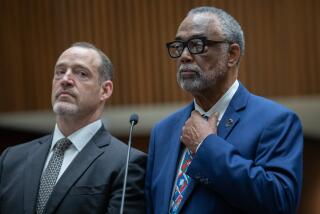Former Bell official says he voted for pay raise out of fear
One of the former Bell city leaders accused of plundering the town’s treasury by taking oversized salaries testified Thursday that the fat paychecks and other extraordinary benefits that came with the job were all but forced on him.
George Cole, a former steelworker, returned to the witness stand for a second day and testified that he voted for a 12% annual pay raise for a City Council board in 2008 only because he feared retribution from then-City Manager Robert Rizzo.
“He had shown himself to be very vindictive if you crossed him at that time,” Cole said. “I was worried that if I didn’t vote for this, if I voted against it, he would do whatever he could to destroy the work that was important to me and the community. I knew that was his character.”
Cole said it was the most difficult decision he ever made while on the council but was in the best interest of Bell — a city, he said, where he had devoted decades to advocating for new schools and programs for at-risk youths and senior citizens.
Cole, along with Luis Artiga, Victor Bello, Oscar Hernandez, Teresa Jacobo and George Mirabal, is accused of drawing an inflated salary from boards and authorities that rarely met and did little work.
The pay increases for the authorities were placed on the consent calendar — a place for routine and non-controversial items that are voted on without discussion. Cole defended the practice and said the agendas, minutes and staff reports were always available to the public at City Hall and at the library.
“I never tried to hide what we were doing,” Cole said.
He also testified that the minutes did not reflect work done for those authorities.
Cole justified his vote for previous City Council pay raises to allow for a more diverse pool of council candidates who could use the money. And when he voted for a council salary increase in 2005, Cole noted that Bell was in a “very strong financial position.”
The 63-year-old also told jurors that when he discovered $15,500 had been deposited into a 401(k)-style account for him, he complained. Cole said Rizzo refused to remove the money.
Initially, Cole said, Rizzo was a first-rate city administrator, making improvements such as repairing and keeping streets clean and erecting a protective fence around the city’s largest park.
“From the time he started, he was able to accomplish things other managers previous to him said couldn’t be done or were unable to do,” Cole said.
Cole said the two would sometimes meet for breakfast to discuss city matters. “It was business,” he said. “It wasn’t two chums getting together.”
But when Cole decided to give up his salary during his last year in office, he said it fractured his relationship with Rizzo. When he learned about Rizzo’s near-$800,000 salary from a story published in The Times in 2010, he said he felt sick.
“I just felt like the dumbest person in the world that this guy had just pulled one of the biggest cons I’ve ever seen on, not just me, but on the city of Bell,” Cole testified.
Rizzo faces 69 felony corruption charges. He and his former assistant, Angela Spaccia, are expected to go on trial later this year.
Cole’s top annual salary was $67,000, his attorney said. At the time, he was earning nearly $95,000 a year as chief executive of the Steelworkers Old Timers Foundation.
In 2004, the city paid the state pension system $36,648 to buy Cole an additional five years of service time. Cole was one of 11 Bell administrators for whom the city bought service time.
CalPERS — the state’s largest public pension program — has disallowed the service time the city bought, saying the buy-ins were not council-approved and that a municipality cannot pay for them.
Cole also was among the 40 or so Bell employees who were scheduled to receive additional payments through Bell’s own supplemental retirement plan, established in 2003. In combination with the CalPERS pension, the payout was among the best retirement plans for non-safety employees in the state. The council never approved the plan.
More to Read
Start your day right
Sign up for Essential California for news, features and recommendations from the L.A. Times and beyond in your inbox six days a week.
You may occasionally receive promotional content from the Los Angeles Times.








